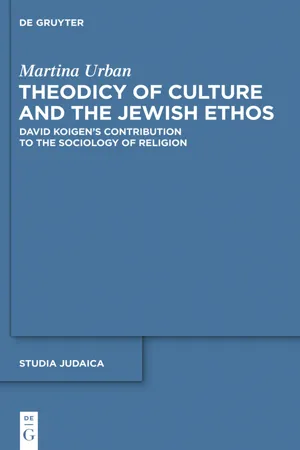
- 277 pages
- English
- PDF
- Available on iOS & Android
Theodicy of Culture and the Jewish Ethos
About This Book
This volume presents the theory of culture of the Russian?born German Jewish social philosopher David Koigen (1879–1933). Heir to Hermann Cohen's neo?Kantian interpretation of Judaism, he transforms the religion of reason into an ethical Intimitätsreligion. He draws upon a great variety of intellectual currents, among them, Max Scheler's philosophy of values, the historical sociology of Max Weber, the sociology of religion of Émile Durkheim, Ernst Troeltsch and Georg Simmel and American pragmatism. Influenced by his personal experience of marginality in German academia yet the same time unconstrained by the dictates of the German Jewish discourse, Koigen shapes these theoretical strands into an original argument which unfolds along two trajectories: theodicy of culture and ethos. Distinguished from ethics, ethos identifies the non-formal factors that foster a group's sense of collective identity as it adapts to continuous change. From a Jewish perspective, ethos is grounded in the biblical covenant as the paradigm of a social contract and corporate liability. Although the normative content of the covenantal ethos is subject to gradual secularization, its metaphysical and existential assumptions, Koigen argues, continue to inform Jewish self-understanding. The concept of ethos identifies the dialectic of tradition as it shapes Jewish religious consciousness, and, in turn, is shaped by the evolving cultural and axiological sensibilities. In consonance, Jewish identity cannot be reduced to ethnicity or a purely secular culture. Urban develops these fragmentary and inchoate theories into a sociology of religious knowledge and suggests to read Koigen not just as a Jewish sociologist but as the first sociologist of Judaism who proposes to overcome the dogmatic anti-metaphysical stance of European sociology.
Frequently asked questions
Information
Table of contents
- Acknowledgments
- Abbreviations
- Introduction
- Chapter One. Theodicy of Culture and the Theory of the Cultural Act
- Chapter Two. Beyond the a priori: Toward a Religion of Intimacy
- Chapter Three. Resituating Judaism: On Pragmatism and Phenomenology
- Chapter Four. Ethos: A non-Essentialist Perspective on Religion and Ethnicity
- Epilogue: Towards a Sociology of Jewish Religious Knowledge
- Bibliography of Koigen’s Works
- Appendix
- Das Ethos im Judentum
- Index